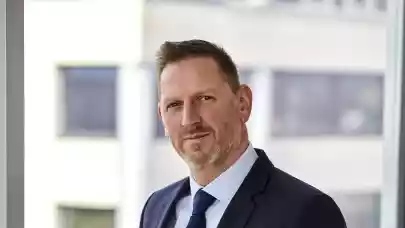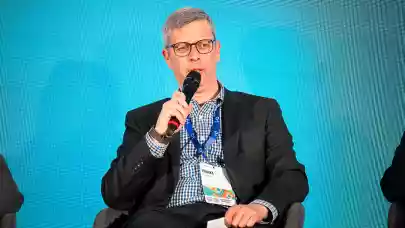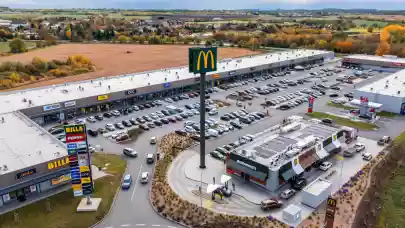
CPI Property Group has committed to significantly reducing its portfolio’s carbon footprint and, at the same time, encourages its tenants to do the same. The Group also invests heavily in special building management systems to reach sustainable operation even faster, says Mátyás Gereben, Country Manager at CPI Hungary who talked to Property Forum about the company’s asset management strategy on the local market.
CPI recently disposed of its only logistics asset in Hungary in a landmark transaction at a record low yield. What can you tell us about the dealmaking process?
In terms of asset classes, CPI Property Group strongly focuses on office and retail. Logistics is not a core activity and has never really been one. Airport City was inherited from the previous acquisition of Ablon and it was always a unique asset within the CPI portfolio. As the company is focusing on its core activity, a decision was made to dispose of this asset. We made this move at the right time, as the investment market is at its peak in terms of logistics investment. That is the reason we managed to reach a high price at a record low yield. Obviously, as an asset management company, we always pay significant attention to professional asset management and try to increase value in the long term. It is another reason why we managed to dispose of Airport City at a record high price.

Mátyás Gereben
Country Manager
CPI Hungary
Is this a definite exit from Hungary’s logistics market?
For the time being, yes. It is up to the stakeholders to decide whether to return to this market segment or not. It is unlikely that we’ll do so in the mid-term.
Are there any new acquisitions on the horizon for CPI Property Group in Hungary?
We are absolutely on the curve of investing in new assets and portfolios which fit into the long-term strategy of CPI PG. Right now, the acquisition of a majority stake in Immofinanz is currently underway and under negotiation by CPI PG. I believe that a cross-border portfolio deal seems a much better investment for us compared to individual asset purchases.
Do you plan any new developments on the Hungarian market?
It is a difficult question in today’s market. Development prices are sky-high, the demand for commercial assets, including retail and office, is somewhat scaling down at the moment because of the uncertainty surrounding COVID and trends such as working from home. We do have development land within our portfolio and plan to create new commercial assets, but I’m not able to give you a clear picture of the timing of these developments.
CPI was among the first CEE-based real estate companies to issue green bonds, both in Hungary and at the group level. How are you using these proceeds to make your local portfolio greener?
CPI was not only the first to issue green bonds but also the first one to publish a green initiative at the Group level. It means that we have made a strong commitment to our investors to achieve certain targets in the future. We promised to reduce our CO2 emission by 30 percent until 2030 and we have made other significant commitments towards the market. With the Hungarian green bond initiative, we want to live up to our promises and follow the path that we stepped on. We want to spend our financial resources on investments, refurbishments, and developments which will facilitate achieving those goals that we had established earlier within CPI’s environmental framework.
How do you encourage your tenants to reduce their carbon footprint?
It is simple: through cooperation. We are unable to achieve the aforementioned goals if tenants do not cooperate with us. In 2022, we will introduce a so-called ‘Green Lease Agreement’ in which tenants will take some obligations to reduce their emission numbers. We try to convince them to take some action to reduce the use of environmentally hazardous or non-protected gas or water. With this green lease initiative, we can create partnerships with our tenants and convince them to join our boat and sail towards a greener future.
What role does technology play in your asset management strategy? Do you think that the successful implementation of an ESG strategy is based on a strong digital component?
Yes, we believe using technology is an important part of managing a portfolio. I always say there is a priority list that shows how we can be successful as an asset management company. At first, we have to take care of the people who work for us. The second most important priority is using the right kind of systems and technology to achieve the most efficient operation and service. We understand that we have to introduce many innovations back and front. An interconnected, intelligent building management system enables us to reduce our CO2 emissions and achieve our sustainability targets faster. I believe that due to our colleagues’ hard work, we are closer to achieving our goals every day.



